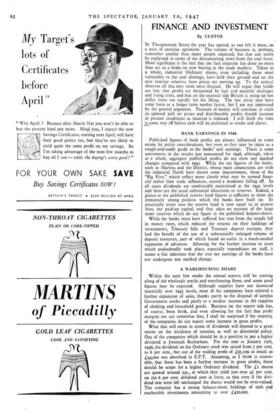FINANCE AND INVESTMENT
By CUSTOS
IN Throgmorton Street 'the year has started, as one felt it must, on a note of cautious optimism. The volume of business is, perhaps, somewhat smaller than many people expected, but that can easily be explained in terms of the disconcerting news from the coal front. More significant is the fact that the fuel situation has done no more than act as a brake on new buying in the stock markets. Taken as a whole, industrial Ordinary shares, even including those most vulnerable to the coal shortage, have held their ground and on the now familiar selective lines prices ace moving up. To the cynical observer all this may seem most illogical. He will argue that yields are low, that profits are threatened by fuel and material shortages and rising costs, and that on the external side Britain is using up her dollar loans too rapidly for, his liking. The last point may have some force as a longer term market factor, but I am not impressed by the general argument. Pressure of money will continue to exert its upward pull on prices and distributable profits should increase in present conditions as taxation is reduced. I still think the time is some way off before cash will be preferred to stocks and shares.
BANK EARNINGS IN 1946 Published figures of bank profits are always influenced to some extent by policy considerations. but even so they may be taken as a rough-and-ready guide to the banks' real earnings. There is some unevenness in the results just announced for 1946, although, taken as a whole, aggregate published profits do not show any marked changes compared with 1945. While the net figures of the banks. such as Martins and the District, whose main connections are with the industrial North have shown some improvement, those of the "Big Five," which reflect more closely what may be termed finan- cial rather than trade influences, record a moderate falling off. In all cases dividends are comfortably maintained at the 1945 levels and there are the usual substantial allocations to reserves. Indeed, a glance at the published reserve fund figures is sufficient to show the immensely strong position which the banks have built up. In practically every case the reserve fund is now equal to, or greater than, the paid-up capital, and that takes no account of the large inner reserves which do not figure in the published balance-sheets.
While the banks must have suffered last year from the steady fall in money rates, which reduced the returns on their holdings of investments, Treasury bills and Treasury deposit receipts, they had the benefit of the use of a substantially enlarged volume of deposit resources, part of which found an outlet in a much-needed expansion of advances. Allowing for the further increase in cows which undoubtedly took place, especially expenditure on staff, it seems a fair inference that the true net earnings of the banks have not undergone any marked change.
A WAREHOUSING SHARE
Within the next few weeks the annual reports will be coming along of tht wholesale textile and warehousing firms, and some good figures may be expected. Although supplies have not increased materially over 1945 levels, most of the companies have enjoyed a further expansion of sales, thanks partly to the disposal of surplus Government stocks and partly to a modest increase in this supplies of clothing and household goods. Business on the export side has, of course, been brisk, and even allowing for the fact that profit margins are cut somewhat fine, I shall be surprised if the majority of the companies do not report some increase in gross profits.
What that will mean in terms of dividends will depend to a great extent on the incidence of taxation, as well as directorial policy. One of the companies which should be in a position to pay a higher dividend is Jeremiah Rotherham. For the year to January 15th, 1946, the dividend on the Ordinary stock was raised from 5 per cent to 6 per cent., but out of the trading profit of L95,109 as much as £44,000 was absorbed in E.P.T. Assuming, as I think is reason- able, that there has been a further increase in gross profits, there should be scope for a higher Ordinary dividend. The Li shares are quoted around 255., at which they yield just over 41 per cent. on the 6 per cent, diVidend now in force, so that even if the divi- dend rate were left unchanged the shares would not be over-valued. The company has a strong balance-sheet, holdings of cash and marketable investments amounting to over L430,000.


































 Previous page
Previous page